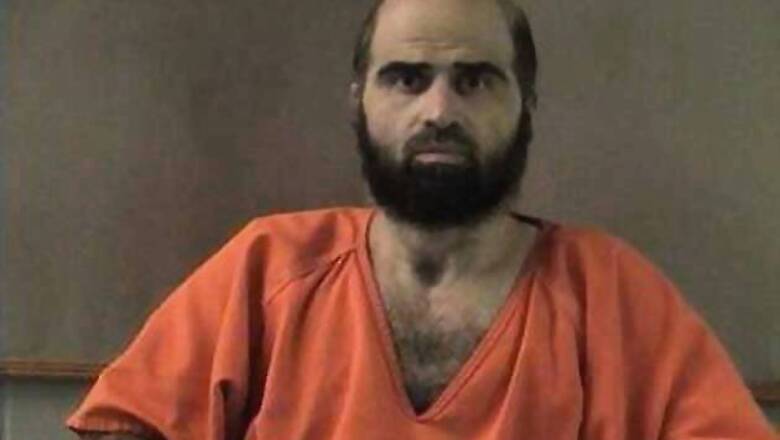
views
Prosecutors in the trial of US Army Major Nidal Hasan on Wednesday asked the jury to sentence him to death for the 2009 shooting rampage at Fort Hood, Texas, saying the convicted gunman is a criminal and "never will be a martyr."
~~amp;nbsp;
The military jury of 13 officers who convicted Hasan of killing 13 people and wounding 31 others, most of them unarmed soldiers, began deliberations to decide his punishment at about 11 am Central Time (1600 GMT).
~~amp;nbsp;
The jury could sentence him to death or to life in prison, although Judge Colonel Tara Osborn instructed the panel on the full range of potential punishments, as mild as a reprimand or military dismissal.
~~amp;nbsp;
Hasan opened fire in a medical facility on the central Texas base, one of the largest in the United States, on November 5, 2009, just weeks before he was to be deployed to Afghanistan.
~~amp;nbsp;
He said in his opening statement on August 6 that he was the gunman and had switched sides in what he considered to be a US war on Islam. An Army psychiatrist, he said nothing to the jury since then regarding his motives.
~~amp;nbsp;
Witnesses testified Hasan screamed "Allahu akbar" ("God is greatest" in Arabic) as he sprayed gunfire with his laser-sighted handgun.
~~amp;nbsp;
An American-born Muslim, Hasan told mental health evaluators he wanted to become a martyr.
~~amp;nbsp;
Lawyers assisting him have said he was actively seeking the death penalty. Hasan, 42, has disputed that claim.
~~amp;nbsp;
Prosecutor Colonel Michael Mulligan told the jurors before they began deliberating Hasan's punishment: "Let it be a sentence to death for his crimes."
~~amp;nbsp;
"What are 13 lives worth? What is a military career worth? What is the use of an arm worth? What is the loss of an eye worth?" Mulligan said. "What is the life of a child growing up without a father or mother worth?"
~~amp;nbsp;
"Don't be fooled. He is not now and never will be a martyr. He is a criminal. He is a cold-blooded murderer," Mulligan said. "He is not giving his life. We are taking his life."
~~amp;nbsp;
The 13 murder victims were soldiers, officers, non-commissioned officers, enlisted and retired, he said. Two of their widows and three of their mothers were in court listening.
~~amp;nbsp;
Hasan, who has acted as his own attorney, turned down his final chance to address the jury before deliberations.
~~amp;nbsp;
"I have no closing statement," Hasan said.
~~amp;nbsp;
Beyond his stunning admission in opening arguments, he has spoken little during his trial, turning down repeated opportunities to make a statement or present evidence.
~~amp;nbsp;
If the jury of 11 white men, one white woman and one black woman unanimously recommends death, Hasan could face lethal injection, possibly making him the first US soldier to be executed by the US military since 1961.
~~amp;nbsp;
Standby defense attorneys for Hasan attempted on Tuesday to present so-called mitigating evidence to argue for a life sentence, including details on his background, family life, education, military experience and logs of his behavior in jail.
~~amp;nbsp;
Hasan objected, complaining to the judge that he had "overzealous defense counsel."
~~amp;nbsp;
The judge ruled in Hasan's favor, saying: "Major Hasan is the captain of his own ship."
~~amp;nbsp;
Hasan, who uses a wheelchair after being paralyzed when shot by police to end the rampage, was convicted on Friday of 45 counts of premeditated murder and attempted premeditated murder.
~~amp;nbsp;
Twenty family members and victims gave evidence during the prosecution's side of the sentencing phase, recounting heart wrenching stories about their loss, grief and efforts to rebuild their lives.
~~amp;nbsp;
A death sentence for Hasan would mean the start of an automatic and lengthy appeals process, typically a minimum of four years, according to military officials. A military execution would require the approval of the Fort Hood commanding general and the US president in order to take place.




















Comments
0 comment